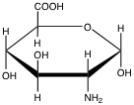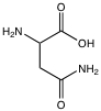Deck 1: The Scope of Biochemistry
Question
Question
Question
Question
Question
Question
Question
Question
Question
Question
Question
Question
Question
Question
Question
Question
Question

Unlock Deck
Sign up to unlock the cards in this deck!
Unlock Deck
Unlock Deck
1/17
Play
Full screen (f)
Deck 1: The Scope of Biochemistry
1
Of Koshland's "pillars of life," which deals specifically with the structure and function of DNA?
A)program
B)compartmentation
C)energy
D)regeneration
E)adaptability
A)program
B)compartmentation
C)energy
D)regeneration
E)adaptability
A
2
Since the earth is approximately 4.5 billion years old, which of the following is true regarding life on this planet?
A)life forms that arose 3.8 billion years ago were able to synthesize the building blocks of life from non-organic molecules
B)the earliest organisms on this planet were anaerobic
C)the oxygen in the earth's atmosphere was originally trapped in ice and thus unavailable for living organisms
D)all multi-cellular anaerobic organisms died out as oxygen became more plentiful
E)none of the above
A)life forms that arose 3.8 billion years ago were able to synthesize the building blocks of life from non-organic molecules
B)the earliest organisms on this planet were anaerobic
C)the oxygen in the earth's atmosphere was originally trapped in ice and thus unavailable for living organisms
D)all multi-cellular anaerobic organisms died out as oxygen became more plentiful
E)none of the above
B
3
The synthesis of which molecule is considered by many to be the root of biochemistry since it was the first synthesis of a biological molecule from non-biological precursors?
A)DNA
B)urea
C)glucose
D)glycine
E)adenosine triphosphate (ATP)
A)DNA
B)urea
C)glucose
D)glycine
E)adenosine triphosphate (ATP)
B
4
Which of the following best describes homeostasis?
A)a non-equilibrium, non-steady state
B)a non-equilibrium steady state
C)an equilibrium-controlled, non-steady state
D)an equilibrium-controlled steady state
E)none of the above
A)a non-equilibrium, non-steady state
B)a non-equilibrium steady state
C)an equilibrium-controlled, non-steady state
D)an equilibrium-controlled steady state
E)none of the above

Unlock Deck
Unlock for access to all 17 flashcards in this deck.
Unlock Deck
k this deck
5
Originally, nucleic acids were thought to serve what role within a cell?
A)catalysts
B)genetic
C)structural
D)buffer
E)none of the above
A)catalysts
B)genetic
C)structural
D)buffer
E)none of the above

Unlock Deck
Unlock for access to all 17 flashcards in this deck.
Unlock Deck
k this deck
6
While there are many ways to compare biochemical similarities in organisms, the molecular tree of life is based predominantly on similarities in what biological molecule?
A)DNA
B)proteins
C)ribosomal RNA
D)transfer RNA
E)lipids of cell membranes
A)DNA
B)proteins
C)ribosomal RNA
D)transfer RNA
E)lipids of cell membranes

Unlock Deck
Unlock for access to all 17 flashcards in this deck.
Unlock Deck
k this deck
7
What functional groups are found in the following molecule? 
A)carboxylic acid, ether, amine and alcohol
B)carboxylic acid, ester, amine and alcohol
C)carboxylic acid, acetal, amine and alcohol
D)carboxylic acid, ether, amide and alcohol
E)carboxylic acid, hemiacetal, amine and alcohol

A)carboxylic acid, ether, amine and alcohol
B)carboxylic acid, ester, amine and alcohol
C)carboxylic acid, acetal, amine and alcohol
D)carboxylic acid, ether, amide and alcohol
E)carboxylic acid, hemiacetal, amine and alcohol

Unlock Deck
Unlock for access to all 17 flashcards in this deck.
Unlock Deck
k this deck
8
Which of the following elements is considered a second tier biochemical element meaning that it is less abundant than first tier elements but still required for life in all organisms?
A)H
B)N
C)P
D)C
E)O
A)H
B)N
C)P
D)C
E)O

Unlock Deck
Unlock for access to all 17 flashcards in this deck.
Unlock Deck
k this deck
9
Which of the following macromolecules is considered a homopolymer?
A)polypeptides
B)ribonucleic acids
C)deoxyribonucleic acids
D)starch
E)all of the above
A)polypeptides
B)ribonucleic acids
C)deoxyribonucleic acids
D)starch
E)all of the above

Unlock Deck
Unlock for access to all 17 flashcards in this deck.
Unlock Deck
k this deck
10
Which of the following organelles is found in plant cells, but not in animal cells
A)chloroplast
B)Golgi apparatus
C)mitochondrion
D)smooth endoplasmic reticulum
E)rough endoplasmic reticulum
A)chloroplast
B)Golgi apparatus
C)mitochondrion
D)smooth endoplasmic reticulum
E)rough endoplasmic reticulum

Unlock Deck
Unlock for access to all 17 flashcards in this deck.
Unlock Deck
k this deck
11
Prior to 1926, the source of biological catalysis was postulated to be possessed by "ferments" which today are called _______.
A)proteins
B)nucleic acids
C)enzymes
D)polysaccharides
E)membranes
A)proteins
B)nucleic acids
C)enzymes
D)polysaccharides
E)membranes

Unlock Deck
Unlock for access to all 17 flashcards in this deck.
Unlock Deck
k this deck
12
Which of the following is a polymer derived from glucose?
A)cellulose
B)ribonucleic acid
C)polypeptide
D)deoxyribonucleic acid
E)none of the above
A)cellulose
B)ribonucleic acid
C)polypeptide
D)deoxyribonucleic acid
E)none of the above

Unlock Deck
Unlock for access to all 17 flashcards in this deck.
Unlock Deck
k this deck
13
The genetic information of viruses is contained within __________ .
A)DNA
B)DNA or RNA
C)specialized proteins with defined amino acid sequence
D)specialized carbohydrates with defined sequence
E)none of the above
A)DNA
B)DNA or RNA
C)specialized proteins with defined amino acid sequence
D)specialized carbohydrates with defined sequence
E)none of the above

Unlock Deck
Unlock for access to all 17 flashcards in this deck.
Unlock Deck
k this deck
14
The molecule pyruvic acid is found at the crossroads of several biochemical pathways. Pyruvic acid is also known as 2-oxopropanoic acid. Based upon this name, draw the molecule.

Unlock Deck
Unlock for access to all 17 flashcards in this deck.
Unlock Deck
k this deck
15
Of the following biomolecules, which is found only in a monomeric form as opposed to a polymeric form?
A)amino acids
B)carbohydrates
C)lipids
D)nucleotides
E)none of the above
A)amino acids
B)carbohydrates
C)lipids
D)nucleotides
E)none of the above

Unlock Deck
Unlock for access to all 17 flashcards in this deck.
Unlock Deck
k this deck
16
Which of the following is a role played by proteins?
A)structural
B)transport
C)information signaling
D)catalysts
E)all of the above
A)structural
B)transport
C)information signaling
D)catalysts
E)all of the above

Unlock Deck
Unlock for access to all 17 flashcards in this deck.
Unlock Deck
k this deck
17
What functional groups are found in the following molecule? 
A)amine, carboxylic acid and ketone
B)amine, carboxylic acid and amide
C)amine, aldehyde and amide
D)amine, aldehyde and ketone
E)none of the above

A)amine, carboxylic acid and ketone
B)amine, carboxylic acid and amide
C)amine, aldehyde and amide
D)amine, aldehyde and ketone
E)none of the above

Unlock Deck
Unlock for access to all 17 flashcards in this deck.
Unlock Deck
k this deck



